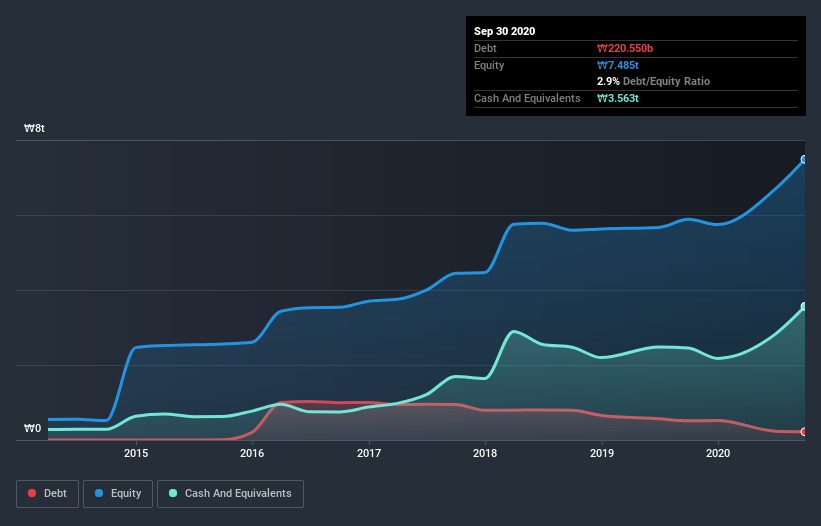- South Korea
- /
- Interactive Media and Services
- /
- KOSE:A035720
These 4 Measures Indicate That Kakao (KRX:035720) Is Using Debt Safely

David Iben put it well when he said, 'Volatility is not a risk we care about. What we care about is avoiding the permanent loss of capital.' So it seems the smart money knows that debt - which is usually involved in bankruptcies - is a very important factor, when you assess how risky a company is. We can see that Kakao Corp. (KRX:035720) does use debt in its business. But should shareholders be worried about its use of debt?
When Is Debt Dangerous?
Debt assists a business until the business has trouble paying it off, either with new capital or with free cash flow. Ultimately, if the company can't fulfill its legal obligations to repay debt, shareholders could walk away with nothing. However, a more frequent (but still costly) occurrence is where a company must issue shares at bargain-basement prices, permanently diluting shareholders, just to shore up its balance sheet. Having said that, the most common situation is where a company manages its debt reasonably well - and to its own advantage. When we examine debt levels, we first consider both cash and debt levels, together.
See our latest analysis for Kakao
What Is Kakao's Net Debt?
The image below, which you can click on for greater detail, shows that Kakao had debt of ₩220.6b at the end of September 2020, a reduction from ₩512.6b over a year. But on the other hand it also has ₩3.56t in cash, leading to a ₩3.34t net cash position.

A Look At Kakao's Liabilities
Zooming in on the latest balance sheet data, we can see that Kakao had liabilities of ₩2.34t due within 12 months and liabilities of ₩1.41t due beyond that. Offsetting this, it had ₩3.56t in cash and ₩187.5b in receivables that were due within 12 months. So these liquid assets roughly match the total liabilities.
This state of affairs indicates that Kakao's balance sheet looks quite solid, as its total liabilities are just about equal to its liquid assets. So while it's hard to imagine that the ₩38t company is struggling for cash, we still think it's worth monitoring its balance sheet. Succinctly put, Kakao boasts net cash, so it's fair to say it does not have a heavy debt load!
Even more impressive was the fact that Kakao grew its EBIT by 198% over twelve months. If maintained that growth will make the debt even more manageable in the years ahead. There's no doubt that we learn most about debt from the balance sheet. But ultimately the future profitability of the business will decide if Kakao can strengthen its balance sheet over time. So if you're focused on the future you can check out this free report showing analyst profit forecasts.
Finally, a company can only pay off debt with cold hard cash, not accounting profits. While Kakao has net cash on its balance sheet, it's still worth taking a look at its ability to convert earnings before interest and tax (EBIT) to free cash flow, to help us understand how quickly it is building (or eroding) that cash balance. Over the last three years, Kakao actually produced more free cash flow than EBIT. That sort of strong cash generation warms our hearts like a puppy in a bumblebee suit.
Summing up
While we empathize with investors who find debt concerning, you should keep in mind that Kakao has net cash of ₩3.34t, as well as more liquid assets than liabilities. And it impressed us with free cash flow of ₩676b, being 248% of its EBIT. So is Kakao's debt a risk? It doesn't seem so to us. The balance sheet is clearly the area to focus on when you are analysing debt. However, not all investment risk resides within the balance sheet - far from it. Case in point: We've spotted 1 warning sign for Kakao you should be aware of.
If, after all that, you're more interested in a fast growing company with a rock-solid balance sheet, then check out our list of net cash growth stocks without delay.
If you decide to trade Kakao, use the lowest-cost* platform that is rated #1 Overall by Barron’s, Interactive Brokers. Trade stocks, options, futures, forex, bonds and funds on 135 markets, all from a single integrated account. Promoted
Valuation is complex, but we're here to simplify it.
Discover if Kakao might be undervalued or overvalued with our detailed analysis, featuring fair value estimates, potential risks, dividends, insider trades, and its financial condition.
Access Free AnalysisThis article by Simply Wall St is general in nature. It does not constitute a recommendation to buy or sell any stock, and does not take account of your objectives, or your financial situation. We aim to bring you long-term focused analysis driven by fundamental data. Note that our analysis may not factor in the latest price-sensitive company announcements or qualitative material. Simply Wall St has no position in any stocks mentioned.
*Interactive Brokers Rated Lowest Cost Broker by StockBrokers.com Annual Online Review 2020
Have feedback on this article? Concerned about the content? Get in touch with us directly. Alternatively, email editorial-team (at) simplywallst.com.
About KOSE:A035720
Excellent balance sheet and good value.


